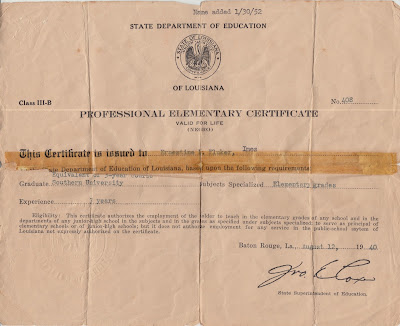For the past couple of weeks I've been assisting the Alumni's of O.W. Dillon School in Kentwood, Louisiana. I put a call out for high school yearbooks and two beautiful women by the names of Annette Vernon Brumfield and Ernestine Johnson still has their 1950-1951 yearbooks. I can't explain how excited and happy I was to take a look at those yearbooks.
While looking through the pages I found several family members of my own. My maternal cousins; Adam Gordon, Willie K. Gordon, Frank Gordon, and Maude Temple. When we start to preserve our family history and the community history, we will find that we're all connected by bloodlines or extended community family, classmates, neighbors or church members.
These two women hold a piece of the legacy of O.W. Dillon School that should never be forgotten. I called my cousin Vernon Gordon, Sr., and asked him if his father Adam Gordon played football. He confirmed that his father did play for the Westside Rams. All these years I didn't know that his father played football. When I got my magnifying glass to take a closer look at the image. I took a second look at number 76, which looks like my him.
I feel so happy that my passion for preserving the history of African American people in St. Helena and Tangiphaoa Parishes had educated me on the rich and unique history we have and the people who shoulders I stand on.
At that time Reginald A. Cotton was the head coach and O.W. Cunnigen was the assistant coach. The team had 23 veteran letterman and well balanced. The next largest man on the squad was an even hundred pound senior tackle veteran Adam Gordon.
The following young men on the squad were;
Willie Finn, Larry Dillon, Richard Morris, Edward Tate, Shelton Johnson, Lionel Brumfield, Jimmy Daniels, Adam Gordon, Alfred Bennett, Fred Buckhalter, Larry Zanders, Robert Cain, Henry Fleming, Milton Curry, Solomon Davis, Julius Strickland, Maurice Dillon, Ernest Brown, Alton Zanders. Albert Perry, Thomas Williams, Elliot Himes, Larry Foster, Charles Harvey, Robert Oden, Anderson Tate, Nelson Finn, Curtis Bryant, Melvin Vernon, Enoch Sims, Earnest Gordon, Anderson Watterson, Joe E. Williams, Louis Ruffin, Robert Stewart, Raymond Brown, Henry Wilson, Alcee Allenn, Geroge Perry, Roy M. James, Rayford Brumfield.
Trainers;
Robert Andrews, Danny Riley, Earnest Walker and Willie Addison. Statisticians are; Leslie Mabry and Willie G. Williams.
Pep Squard;
Earline McDowell, Mary Mills, Ruthie James, and Gloria M. Seal.
Cheerleaders;
Derlean Kirkwood, Helen Cyprian, Shirley White, Lillie Frazier, Juanita Bush, Sarah Perry, Helen Buckhalter, Gloriastine Wilson, Rosemary Heart and Jeanne
Source: Article for a local newspaper. The name and date of the newspaper wasn't attached to the article.
































